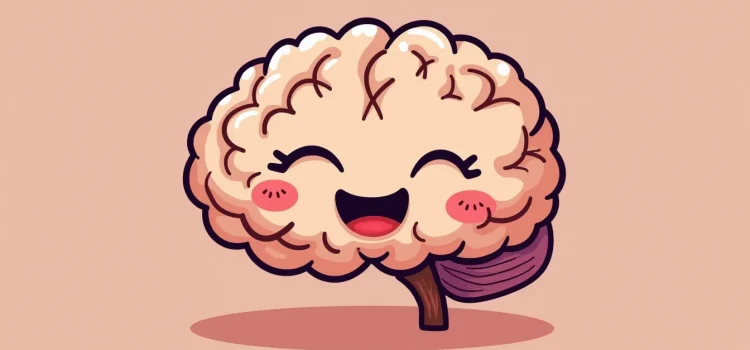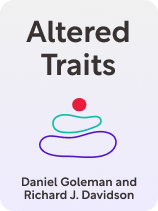

This article is an excerpt from the Shortform book guide to "Altered Traits" by Daniel Goleman and Richard J. Davidson. Shortform has the world's best summaries and analyses of books you should be reading.
Like this article? Sign up for a free trial here.
Is meditation really as beneficial as people claim? What specific changes can it make to your brain and overall well-being?
Meditation has gained popularity in recent years, with many touting its numerous benefits. In Altered Traits, Daniel Goleman and Richard Davidson separate the signal from the noise to clarify what we do and don’t know about how meditation changes the brain—and, therefore, the meditator.
Keep reading to learn about the science-backed effects of meditation.
How Meditation Changes the Brain
Daniel Goleman and Richard Davidson are psychologists, writers, and lifelong meditators who helped pioneer research on meditation in the modern West. In their book Altered Traits, they detail the most clearly supported benefits of meditation and argue that the practice has one key effect: It alters traits. In other words, it produces lasting changes to your brain and therefore how you live.
Let’s look at what the best studies say about how meditation changes the brain and the meditator.
Effect 1: Meditation Can Train Your Attention
Broadly put, meditation trains your attention, and this can improve related cognitive functions as you age. Different practices can boost various aspects of attention, and lasting benefits come with sustained practice, much as lasting muscular changes require continual training. According to the authors, both traditional and secular ways of meditating have been found to influence different aspects of attention:
- Mindfulness-Based Stress Reduction (MBSR) training, a popular modern method that Jon Kabat-Zinn created, can temporarily strengthen selective attention (your ability to choose what you focus on). MBSR is a secular eight-week program that aims to reduce stress, anxiety, pain, and other ills.
- Insight meditation (vipassana) may produce a trait change related to selective attention. Research suggests that consistent, long-term practice can make it more effortless to find and rest in a state of focused awareness.
- Mindfulness can reduce the damage that multitasking does to sustained attention. Research shows that whereas multitasking harms your ability to focus, as little as eight minutes of basic, secular mindfulness practice can restrengthen attention.
| Is Meditation the Only Way to Train Attention? In light of reports on our declining attention spans, this research is great news. Further, meditation might not be the only way to improve your attention. In Proust and the Squid, Maryanne Wolf contends that what and how we read also affects our attention spans. Specifically, she says that the short, sound-bite-driven information landscape of the modern day is shortening our attention spans, reducing our focus, and changing the structure of our brains. To address this problem, she advocates for “deep reading”—basically, the more time you spend immersed in good books and long-form writing, the more you’ll improve your attention span, focus, and ability to lose yourself in deep thought. Research seems to support Wolf’s position: One study found that reading can strengthen selective attention, producing a similar result to those found in studies of MBSR. However, no studies suggest that reading can produce trait changes related to selective attention, so reading may not train attention as effectively as vipassana. As for sustained attention, reading srelies heavily on your capacity to stay focused. While this doesn’t necessarily mean that reading improves sustained attention, it suggests that reading and mindfulness could work well together as ways to train and practice skills related to attention. |
Effect 2: Meditation Can Help You Cultivate Compassion
Next, the authors explain that meditation can train you to feel positive emotions more deeply. These results come largely from research on loving-kindness meditation, or metta—a practice of extending compassion to yourself, those close to you, and all living beings.
According to the authors, prosocial emotions (positive feelings for other people) fall along a spectrum. On one end is simple empathy, or feeling for someone who’s suffering. In the middle is compassion, or feeling with them, and on the other end is altruism, or feeling strongly enough to actually help another person. Research indicates that loving-kindness meditation (practiced using traditional or secular means) may:
- Increase the odds that the practitioner actively helps someone who appears to be suffering. That is, metta predisposes people to altruistic action.
- Enhance empathy by activating brain circuits that process prosocial emotions as well as those that prime the body to respond to the suffering of others.
- Induce swifter changes to the brain than attention-based meditations—eight hours of metta can expand brain circuitry related to compassion, and sixteen hours may weaken the meditator’s implicit biases (or unconscious prejudices).
| Meditation’s Effect on Prosocial Emotions Isn’t Clear-cut In a meta-analysis of studies on meditation and compassion, researchers found that meditation may have a more limited effect on pro-social behaviors than previously thought. They report that prosocial emotions appear only to increase during interventions in which the meditation teacher was also a co-author of the study. Further, they found that current research doesn’t support the conclusion that meditation decreases prejudice or aggression. This meta-analysis of studies also demonstrates Goleman and Davidson’s points about the need for rigor. On the one hand, it only includes randomized controlled trials, which is a strong positive in their view. On the other hand, it groups together different kinds of meditations under “mindfulness,” a practice that they critique. |
Effect 3: Meditation Can Transform Your Sense of Self
Pivoting away from these tangible benefits, the authors turn to meditation’s relationship with your sense of self. Traditional meditative paths aim to release the practitioner’s conventional sense of self—the persistent feeling and belief that “I am this person”—so they can reach nirvana. Emerging neuroscience might explain this goal: Research has begun to discover how the brain constructs your sense of self and how meditation may loosen the circuits that produce it.
As the authors explain, your sense of self comes from the brain’s default mode network (DMN), or the baseline state of absent-minded thinking and rumination that you experience daily. The DMN comes online when you’ve nothing in particular to do. It manifests as a persistent narrative voice that centers on yourself, monologuing about your day, your experiences, your pains and stressors, as well as experiences past and those yet to come.
By way of that continually unfolding narrative voice, you come to personally identify with your thoughts, emotions, sensations, pains, and so on. They all become your experience and constitute you. As a result, you have a distinct sense of self; a feeling that I am this person.
(Shortform note: In The Power of Now, Eckhart Tolle characterizes the persistent voice in your head as your ego, which he describes as an internal entity that controls your mind and behavior. It creates your identity based on different pieces of information, including your job, income, relationships, health, appearance, and so on. It becomes so central to your life that you start to think that you are your ego. If we suppose that Tolle’s concept of the ego is akin to the sense of self that the default mode network produces, and that people tend to identify with the ego, it follows that you can get stuck in a narrow view of yourself. That is, you might over-identify as your internal monologue without realizing that it’s just how you experience your brain’s idle mode.)
According to the authors, research has begun to show that meditation can lessen the DMN activity that creates this sense of self. In doing so, meditation leads the practitioner to a subjective experience with less definite boundaries between self and other. Studies indicate that:
- Mindfulness and loving-kindness meditations can both reduce the activity of the DMN. Scans show that in early stages, meditation strengthens brain circuits that inhibit DMN activity. In later stages, meditation begins to unwire the connections within the DMN itself.
- Lessened DMN activity begins as a temporary experience of ease and selflessness. With long-term practice, it can become a lasting trait. That is, the meditator’s sense of self weakens and her awareness becomes more tranquil.
(Shortform note: These findings on mindfulness and loving-kindness meditations parallel research findings on psychedelics, another known way to lessen the activity of the DMN. Whereas these meditations seem to inhibit DMN activity, psychedelics can produce full-on “ego death,” or complete dissolution of your sense of self. Research suggests that both may contribute to long-term trait changes toward selflessness. That is, permanently lessened DMN activity, from either meditation or psychedelics, seems to both weaken your sense of self and get you acting more selflessly. As of yet, the full extent of these effects isn’t known.)
Effect 4: Meditation Might Improve Emotional Health
According to the authors, meditation has had a largely positive impact on psychotherapy and psychiatry, two modern Western approaches to healing the mind. At the same time, there isn’t enough evidence yet to say that meditation is broadly effective at treating mental health challenges. But the research is ongoing, and many psychologists have begun to experiment with meditation as a treatment tool in practical settings. Much of this research centers on Mindfulness-Based Cognitive Therapy (MBCT), and studies indicate that:
- Basic MBCT training may be viable as a treatment for depression. Some studies found it to be similarly effective to medication, yet lacking negative chemical side effects.
- Mindfulness training may also reduce anxiety. Research has found that basic mindfulness practice helps patients let go of patterns of negative self-talk and thereby reduce their anxiety.
- Loving-kindness meditation may help people suffering from trauma, such as those with PTSD. Specifically, it may help them process their trauma and reduce symptoms such as panic attacks.
(Shortform note: More recent research indicates that MBCT works even better when combined with pharmaceutical medications—in a study on the relapse rate of depression, MBCT plus standard medications achieved a 12.31% relapse rate, less than half that of the control group. As for anxiety, a 2022 study found that mindfulness training is at least as effective as escitalopram, a common anxiety medication. Regarding loving-kindness, some practitioners have combined their metta practices with entheogens such as MDMA, which also show promise in healing trauma.)
As a cautionary note, the authors say that a small number of long-term meditators who explore meditation as a psychotherapeutic tool experience intense bouts of psychological distress at a certain point along the path. These cases are rare, however, and the research largely supports the promise of meditation-based approaches to therapy.
(Shortform note: While this so-called “dark night” of meditation-induced distress might be rare, it’s worth pausing to consider. Some anecdotal reports indicate that negative changes to a meditator’s psyche can last for months or can even be irreversible. In part, this may be due to the proliferation of easy-to-access meditation programs that lack real guidance from experienced teachers. Playing on the authors’ earlier analogy, meditating through an app is a bit like learning to deadlift from an app—the basic information is there, but there’s no teacher to tailor the lessons to your needs or to care for you if things start to go awry. So keep in mind that meditation, like weight training or running or sports, isn’t without risks.)
Effect 5: Meditation Might Benefit Physical Health
What about the effects meditation may have on your physical health? According to the authors, the research shows promise yet remains tentative. Findings indicate that:
- MBSR may help palliative care patients experience less suffering, likely by helping them change their relationship with pain rather than removing the pain altogether.
- Short-term mindfulness training appears to reduce cellular inflammation. These benefits ramp up over time, and they may eventually become a trait effect—that is, long-term meditators seem to experience less inflammation over the long term.
- Three months of practicing mindfulness and loving-kindness meditation can increase levels of telomerase (a protein that helps cells reproduce) and thereby slow aging.
- Long-term meditation may improve brain health. Research shows that meditators often have increased brain volume, though the evidence remains inconclusive.
| Are Tentative Findings Enough to Act On? While it’s still early, the research suggests that meditation, especially mindfulness-based practices like MBSR, can provide tangible physical health benefits. How might you apply these in practice? In general, establishing a consistent meditation practice could help optimize your physical health in several key areas: • You don’t need to be a palliative care patient to change your relationship with suffering. Practicing MBSR could change your experience of pain in general or of the pain caused by illness. • The anti-inflammatory effects observed from even short mindfulness training suggest that it could help you address any sort of inflammation—for instance, it could be worth trying if you get headaches or migraines. • The findings on increased neural volume in meditators hint at potential benefits to brain and cognitive health. For instance, if meditation can help increase brain volume, it might also slow neurodegenerative conditions like Alzheimer’s. As the research continues, these effects and others may find more solid ground. Nonetheless, the existing evidence is compelling enough that anyone interested in improving their overall health and well-being would do well to practice some form of meditation. |

———End of Preview———
Like what you just read? Read the rest of the world's best book summary and analysis of Daniel Goleman and Richard J. Davidson's "Altered Traits" at Shortform.
Here's what you'll find in our full Altered Traits summary:
- How the West has distorted true meditation
- Why meditation is so difficult to study
- The 5 proven benefits of having a meditation practice






